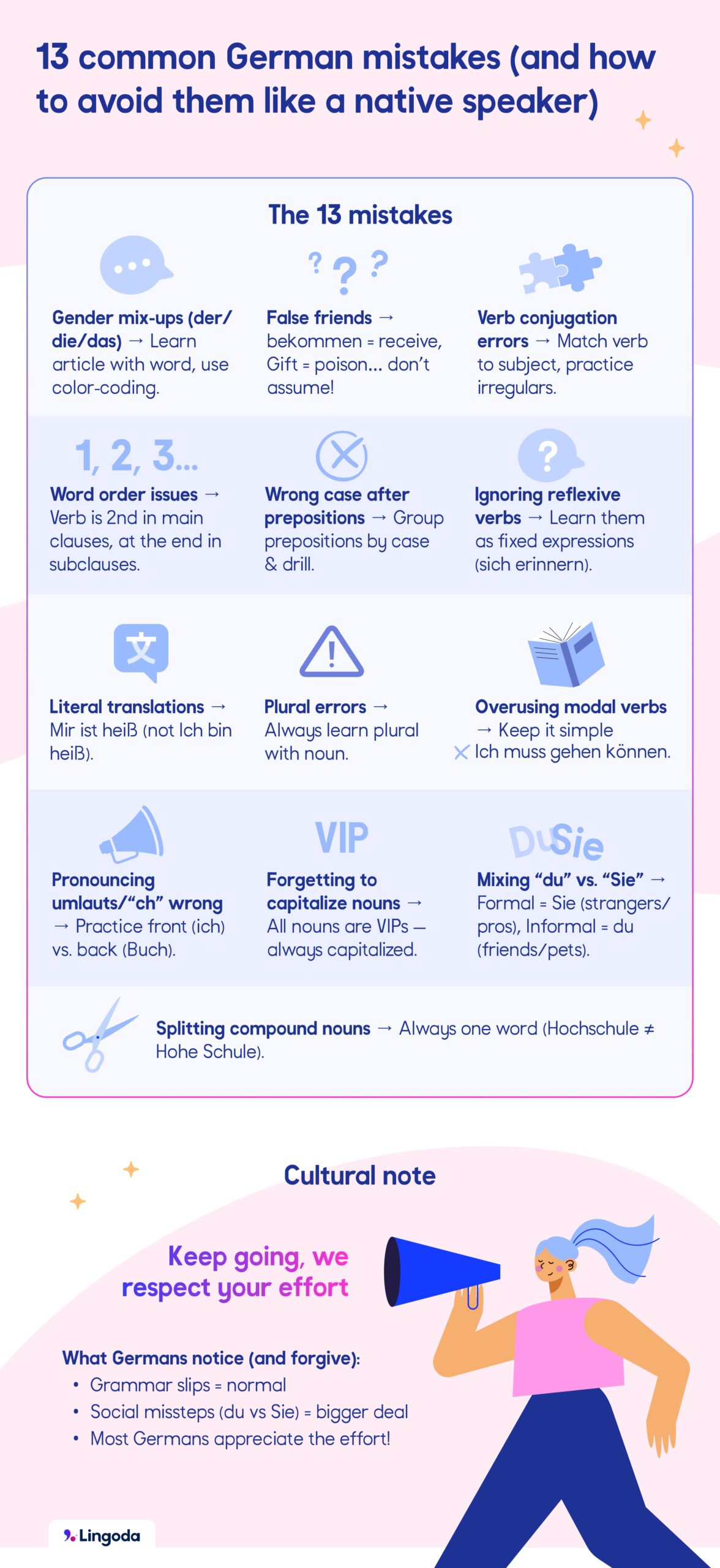13 common German mistakes (and how to avoid them like a native speaker)
Making mistakes is a natural (and necessary) part of learning German—no matter your level. Whether you’re struggling with sentence structure or second-guessing every “der,” “die,” and “das,” you’re not alone.

Most learners hit the same roadblocks, especially when German grammar, pronunciation, and culture don’t match what they know from English. From confusing literal translations to overusing modal verbs, certain patterns tend to trip people up again and again. The good news? Once you know what to watch for, you can correct course quickly and build real fluency.
This guide walks you through the 13 most common German mistakes and shows you how to fix them (and sound more like a native in the process).
- 13 most common German mistakes (and how to fix them)
- The mistakes that native German speakers do notice (and forgive)
- FAQs
13 most common German mistakes (and how to fix them)
1. Confusing “der,” “die,” and “das” (incorrect gender usage)
Ah, German noun genders. One of the most infamous pain points for learners—and with good reason. Unlike in English, every noun in German has a gender: masculine (der), feminine (die), or neuter (das). Unfortunately, there’s no reliable rule but there areer patterns and hints that help you determine the gender of a noun.
Instead of guessing, treat the article as part of the word when you learn new vocabulary. Don't memorize Haus, memorize das Haus. Color-coding nouns in your notes (e.g. blue for der, red for die, green for das) can also help cement the association.
2. False friends (‘falsche Freunde’)
Some German words look so familiar, it’s easy to assume they mean the same thing as their English counterparts. This is where false friends—words that look similar but differ in meaning — can cause embarrassing mix-ups.
A few common examples:
- bekommen = to receive (not to become)
- Chef = boss (not chef)
- Gift = poison (definitely not a present)
- Rat = advice (not a small rodent)
The fix? Don’t assume. Keep a running list of these lookalikes and refer back to it regularly. Flashcards or sticky notes can help until the correct meanings stick.
3. Misusing verb conjugations
Verb conjugation is foundational to German and it’s easy to get wrong. Many learners forget to match the verb form to the subject, or mix up weak and strong verb patterns.
For example:
- Incorrect: du gehen
- Correct: du gehst
Irregular verbs (like fahren, sehen, nehmen) don’t always follow patterns, so repeated exposure is key. Try to engage with verbs across all contexts—reading, listening, writing, and especially speaking—so that correct conjugations become second nature.

Learn German with Lingoda
How it works

4. Messing up word order (‘Wortstellung’)
If you’re translating directly from English, German word order can feel like a puzzle. One of the most common mistakes is placing the time element at the end, as in: Ich habe gegessen gestern.
In standard German, the verb typically comes second in main clauses:
- ✅ Ich habe gestern gegessen.
And in subordinate clauses, the conjugated verb moves to the end:
- ✅ Ich weiß, dass du müde bist.
Mastering word order takes time, but once it clicks, your sentences will sound much more natural and easier to follow.
5. Using the wrong case after prepositions
In German, prepositions trigger specific grammatical cases—accusative, dative, or genitive. Using the wrong case can make your sentence grammatically incorrect or change its meaning.
Here’s a quick reference to start building those associations:
Always accusative:
- durch, für, gegen, ohne, um
→ Ich gehe ohne meinen Hund. (I go without my dog)
Always dative:
- mit, nach, bei, seit, von, zu
→ Ich fahre mit dem Bus. (I travel by bus)
Two-way (accusative or dative depending on motion):
- in, auf, an, über, unter, vor, hinter, neben, zwischen
(motion → accusative)
→ Ich lege das Buch auf den Tisch. (I put the book onto the table.)
(location → dative)
→ Das Buch liegt auf dem Tisch. (The book is lying on the table.)
Group prepositions by case and drill them with example sentences. It’s less about memorizing charts and more about recognizing real usage over time.
6. Ignoring reflexive verbs
This one often slips under the radar. Some German verbs require a reflexive pronoun—like mich, dich, or sich—and skipping it changes the meaning.
- Ich erinnere dich = I remind you
- Ich erinnere mich = I remember
There’s no way around it: reflexive verbs need to be learned as complete expressions. Once you spot a few patterns, they become easier to remember and use correctly.
7. Making literal translations from English
This is where language learning meets culture shock. A sentence like Ich bin heiß may seem like a logical way to say “I’m hot” but it actually implies you’re feeling sexually aroused.
The correct version?
- Mir ist heiß.
These direct-translation mistakes often cause confusion or unintended humor. Learners often share their most awkward mix-ups—and almost always, they come from translating English too literally. Instead, focus on learning whole phrases, not just vocabulary.
8. Plural formation errors
German plurals are inconsistent, and there's no single rule that applies to all nouns. Some add -e, others -n, -en, -s, or no ending at all.
Examples:
- der Tisch → die Tische
- die Frau → die Frauen
- das Auto → die Autos
The only real fix? Learn nouns together with their plural forms. Flashcards or vocabulary apps like Anki can help reinforce the connection.

9. Overusing or misusing modal verbs
Modal verbs—like können, müssen, dürfen, sollen—are powerful tools in German. But overusing them or stacking them unnecessarily leads to clunky, confusing sentences.
You don’t need to say:
- ❌ Ich muss gehen können.
Instead, break it down:
- ✅ Ich kann gehen.
- ✅ Ich muss arbeiten.
Simplify your sentence structure first and get fancy later.
10. Mispronouncing umlauts and “ch” sounds
Pronunciation can be intimidating, especially when sounds don’t exist in English. Umlauts like ü, ö, and ä are often flattened or ignored by learners, while the German “ch” has two distinct sounds that trip people up.
- ich → soft, front-of-mouth sound
- Buch → harsher, back-of-throat sound
Mastering these will instantly make your German sound more natural.
11. Forgetting to capitalize nouns
Every German noun is capitalized. This might not seem important, but it’s a key part of written communication. Missing capitalization doesn’t just look “off”. It can make your sentence harder to understand.
A fun trick? Think of German nouns as VIPs: they always wear a capital letter to stand out.
12. Incorrect address forms (“du” vs. “Sie”)
Using du when you should say Sie is a mistake that can offend, even if your grammar is perfect. German has clear distinctions between formal and informal address, and context is everything.
Use Sie with:
- Strangers
- Elders
- Professionals or service staff
Use du with:
- Friends
- Children
- Pets
When in doubt? Go formal. Most Germans will let you know if it’s okay to switch.
13. Spelling errors with compound nouns
German loves long, stacked nouns—and they must be written as a single word. Splitting them up can change the meaning entirely.
Example:
- Hochschule = university
- Hohe Schule = high-level riding technique (not a school at all)
Break long compounds into parts to understand their meaning—and always double-check spelling when writing them.
The mistakes that native German speakers do notice (and forgive)
Most Germans are surprisingly understanding when it comes to learner mistakes. They're used to hearing der instead of die, or slightly garbled word order. What stands out more are social or cultural missteps—like using du too casually, or saying something totally unintended due to a false friend.
But ultimately, Germans tend to appreciate the effort. They know their language isn’t easy and respect anyone who tries to learn it.
What are the most common mistakes in German for English speakers?
Gender errors, literal translations, and case mix-ups are at the top of the list.
Do Germans care if I make mistakes?
Not usually. As long as you’re making an effort, most will be supportive — and may even help you out.
What’s the fastest way to stop making the same German mistakes?
Get real-time feedback through conversation. Apps and books are great, but nothing beats speaking with someone who can correct you gently and explain why.
Turn these mistakes in German into learning wins
Making mistakes doesn’t mean you’re failing. It means you’re improving. Every corrected error sharpens your understanding and brings you one step closer to confident communication.
At Lingoda, our native-level teachers help you catch these mistakes early, explain them clearly, and guide you toward fluency—all in small group classes that are flexible, focused, and built around real-life language.
Whether it’s gender, grammar, or pronunciation, we’ll help you fix the tough stuff and speak German with confidence, from Day One.

Learn German with Lingoda
How it works

We use AI tools to support idea generation and drafting. Every article is edited by our editorial team to ensure accuracy, clarity, and quality.
















